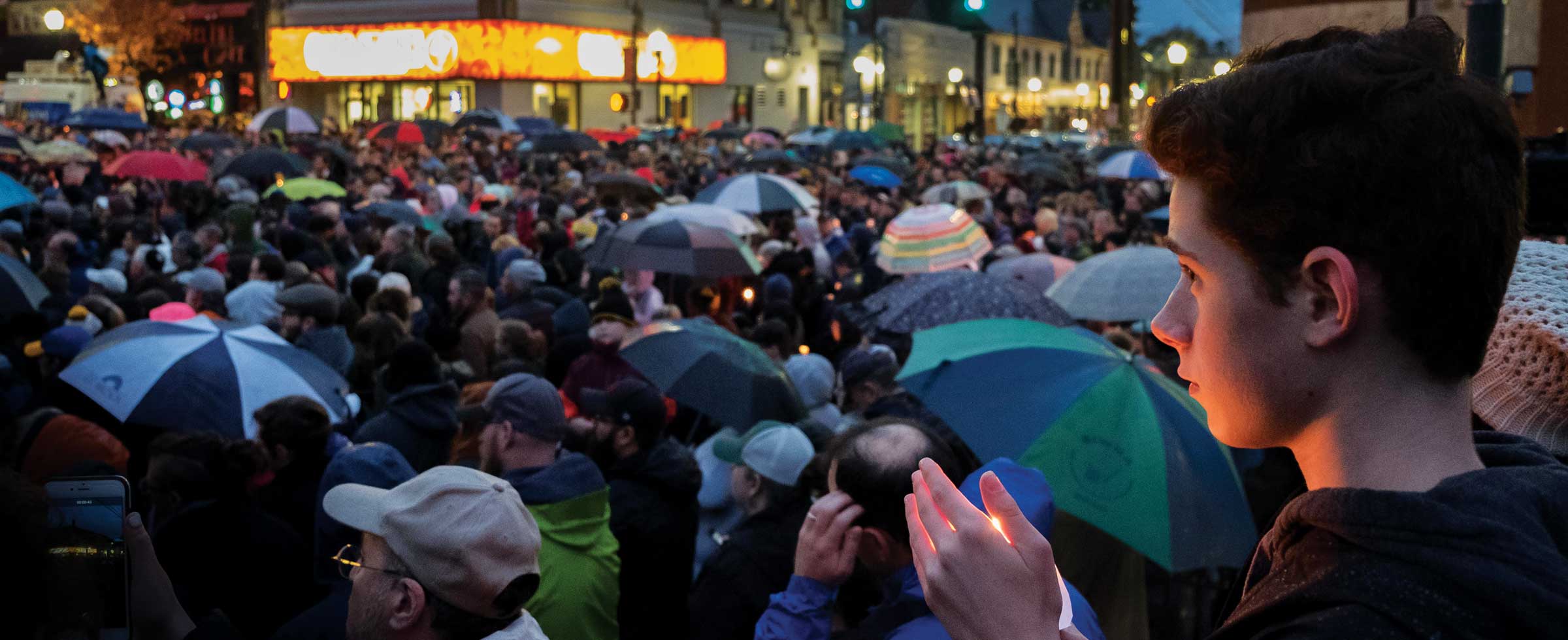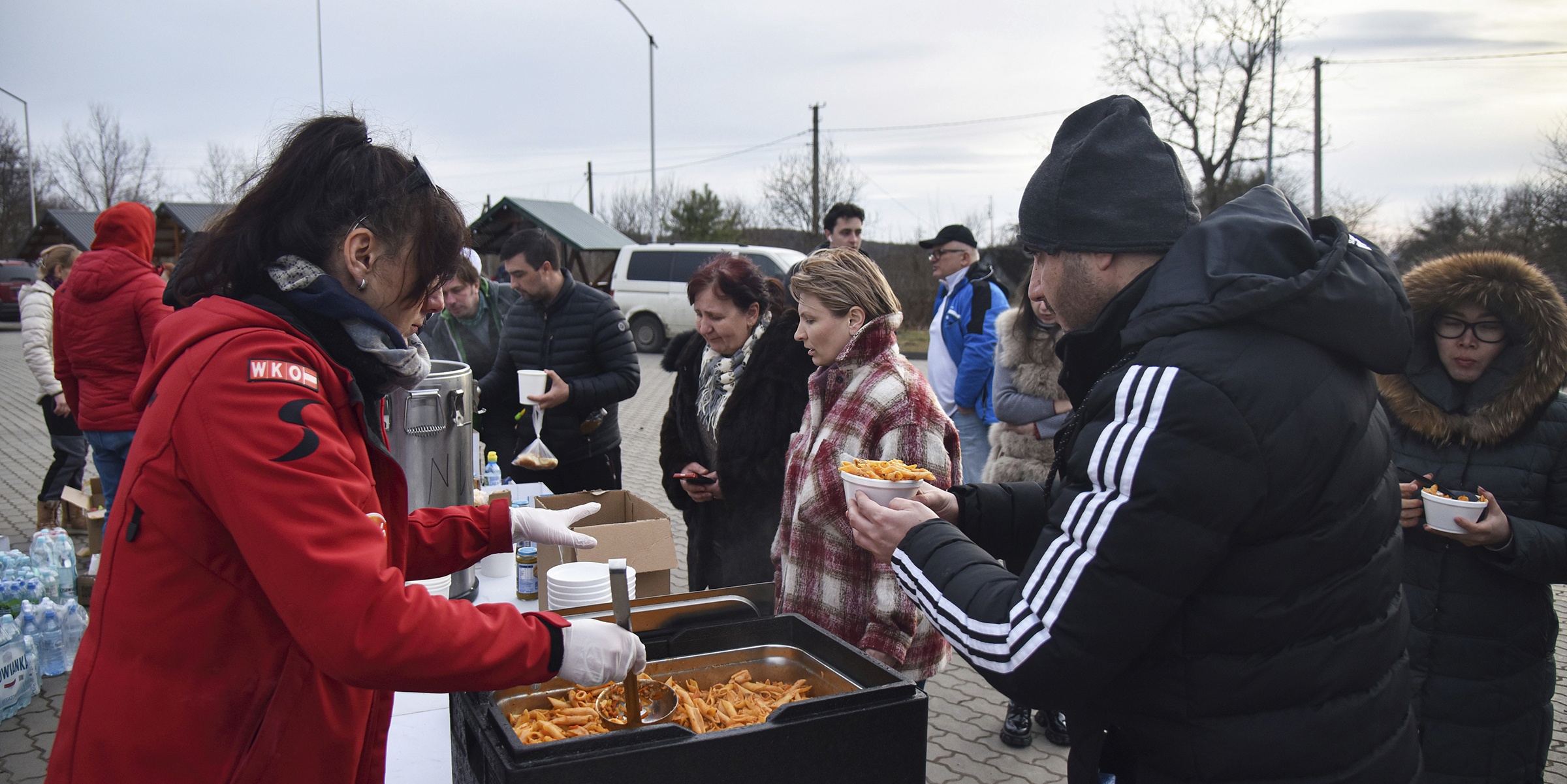First we bind the wounds, then we...Confronting the human cost in a year of polarization, profiling and fear of the Other

The crowd at a Oct. 31 march against hatred and violence in response to the Oct. 27 mass shooting at Tree of Life synagogue.
ON A BRISK AND RAIN-DRIZZLED SATURDAY in Pittsburgh last fall, the sketchy details of yet another mass shooting in an American city buzzed on cell phone news feeds and blared over televisions and car radios. For those trying to sort through the early reporting, it was agonizingly familiar — a gunman steeped in white supremacist ideology had gone on a bloody rampage.
For the region’s residents, the news of 11 dead and six injured — including four police officers — during Shabbat services at a Squirrel Hill synagogue was a shock to the soul of the city. This was not a terrorist attack in a major metropolis, or on a military base, or at a popular tourist spot in a foreign country. It was happening “around the block,” or “a few miles away” in what actually was Mister Rogers’ neighborhood. To add insult to injury, the killing ground was the sanctuary of a place of worship.
It was the second time in a year that hometown Pittsburgh made national news for landing on a “Those Places” list.
The first was on June 19 when the city joined scores of others across the country as the site of a police officer killing of an unarmed young black man. Antwon Rose, 17, of Rankin was shot while fleeing an East Pittsburgh police officer who had pulled over the car in which Rose was a passenger. A few minutes earlier, the car had been involved in a drive-by shooting in North Braddock.
The Oct. 27 Tree of Life shootings placed Pittsburgh on the section of the list that covers cities marked by an act of mass murder. Our designation carried a terrible footnote: “deadliest anti-Semitic attack in U.S. history.”
For many of us at the Foundation, the mass killing, the physical and mental injuries, the defilement of a sacred space, and the de-humanization of people based on religion and race were all too familiar.
In the summer of 2015, we were wondering how Charleston, S.C., could ever recover after a 21-year-old white supremacist entered the Emanuel African Methodist Episcopal Church in that city and shot to death the pastor and eight others. We reached out to staff at the Coastal Community Foundation serving that region and steered our donors to an assistance fund for victims’ families, the congregation and the community. A year later, as the community was still struggling to recover, our Program team commissioned works by 10 Pittsburgh poets and assembled them as “Psalms for Mother Emanuel,” a chapbook to present to the Emanuel congregation, the people of Charleston and Pittsburgh in recognition of what their acts of grace can teach us in the struggle to end continuing mass violence.
During a visit to Pittsburgh’s Jewish community in the days after the Tree of Life shootings, the Rev. Eric S.C. Manning, who took over as Emanuel’s pastor in 2016, spoke about how long and tough the road to recovery can be for a congregation. “The trauma can only be washed away little by little — by patience, by understanding, by just love and grace,” he told a group at a funeral service for one of the victims.
No doubt, the same is true for the larger community, and some of the ministering duties must be taken up by organized philanthropy. In the community foundation network, we specialize in first-response financial support.
But raising money to bind the wounds is only the first step. What happens after that?
Our President and CEO, Maxwell King, posed that question in a July 2016 blog post after the shooting death that month of Philando Castile, a 32-year-old black American, by police officer Jeronimo Yanez in a St. Paul, Minn., suburb, and the ambush shootings of five Dallas officers by a 25-year-old Army reservist intent on revenge for police shootings of African Americans.
“This is — A week? A month? A year? I have lost count — in which disastrous events highlight the inability of communities across the country, including ours, to come to an honest reckoning on racism and other forms of discrimination. How do we at a community foundation in a mid-sized American city end the polarization, profiling and fear of the ‘other’ that leads to the taking of human lives?”
Now two years later, we have our own dead to bury. The community choir raises its voice anew with the familiar refrain: “It never stops. How do we make it stop?”
The longer-term response from the Foundation, says King, is to convene community conversations. What comes out of these will help develop grant-making strategies to counter anti-Semitic and racist hate speech.
The Foundation also will be researching related issues ripe for policy change through its Vibrant Democracy funding priority area. And efforts to combat poverty, tribal divisiveness and isolation in communities will come through programs covered under the Foundation’s 100 Percent Pittsburgh organizing principle, which has committed about 60 percent of discretionary grantmaking to creating new opportunities for the 30 percent of Pittsburgh area residents left out of the revitalized economy to become
full participants.
“I don’t know of a community foundation in the country that has developed the definitive manual for how to eliminate the conditions that lead to mass killings based on hate and discrimination,” says King. “But by sharing painful experiences and ideas that have been successful, we can be more effective.” A recent example of that was Pittsburgh Foundation staff’s assistance to their counterparts at the Ventura County Community Foundation as they were scrambling to respond after the killing on Nov. 7 of a dozen people — most of them college students — at a bar in Thousand Oaks. The lone gunman fired 50 rounds from a Glock .45-caliber pistol.
Many of us in the country’s community foundation network are intent on developing system expertise to respond to mass murder and other instances of violence fueled by bigotry and hatred. It is absolutely the right thing to do in keeping with our missions. It also aggrieves us beyond words that we must do so.
GENEROSITY IS STRONGER$718,000 raised for community recovery IN THE DAYS FOLLOWING THE SHOOTING at Tree of Life, the Foundation established the #LoveIsStronger Critical Needs Alert online giving campaign, matching every gift dollar-for-dollar. The campaign was extended twice as gifts continued to pour in from across the country. By the time #LoveIsStronger concluded on Nov. 19, $718,000 had been raised for eight organizations, including the three congregations that worshiped at the synagogue and nonprofits that are helping the community and first responders to heal. Most gifts were for $200 or less and came from individuals who felt compelled to do something — anything — to stand against senseless hate and violence. Pittsburgh Foundation donors Richard and Priscilla Hunt gave $25,000 and W. Mike Glenn gave $20,000 in memory of his wife of 61 years, Cordelia. The East End Brewing Co. in Homewood donated 100 percent of profits from a single night, $3,600, to the fund. Hillman Family Foundations gave $25,000. The Charlottesville Area Community Foundation, whose community was affected by racial hatred and violence during the 2017 Unite the Right white supremacist rallies, donated, as did the Walmart Foundation, which gave $50,000. Distribution of funds to the beneficiary organizations began in early December. |
Original story appeared in the Forum Quarterly Fall 2018.





